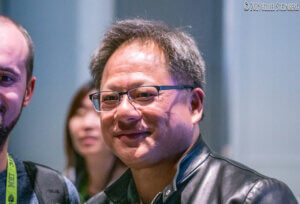“I wish you ample doses of pain and suffering.”
That is the unconventional message Nvidia CEO and founder Jensen Huang had for students at Stanford University, his alma mater, where he spoke last month at the Stanford Institute for Economic Policy Research.
According to Huang, elite educational pedigrees alone are not necessarily the best predictor of success.
“Greatness is not intelligence. Greatness comes from character. And character isn’t formed out of smart people, it’s formed out of people who suffered,” said the Stanford alum.
Instead, the man who presides over one the world’s most valuable companies in terms of stock market valuation, now looks to find certain traits in job applicants that include resilience, grit and determination, which he contends lead to innovation and success in the workplace.
Counterintuitively, Huang believes that having very high expectations coming out of an Ivy League education can potentially set people up for less resilience when faced with failure or adversity, which are inevitable in any career path.
“Unfortunately, resilience matters in success,” he said to the students. “I don’t know how to teach it to you except for I hope suffering happens to you.”
His comments indicate a view that real-world experience, involving struggles, obstacles and suffering, can instill the resilience needed for long-term success. Therefore, he believes that employers should look beyond just the prestige factor of a university and more closely at the inner drive, mindset and resolution of potential hires.
“To this day I use the phrase ‘pain and suffering’ inside our company with great glee,” said the chief executive. “I mean that in a happy way, because you want to refine the character of your company. You want greatness out of them.”
In 2011, Huang shared a similar sentiment in another speech he gave at Stanford, stating, “Unless you have a tolerance for failure, you will never experiment, and if you don’t ever experiment, you will never innovate. If you don’t innovate, you don’t succeed.”
Hiring PHDs
The Nvidia founder’s statements about valuing resilience over educational pedigrees align with the old Wall Street adage about hiring what they call “PHDs”—the poor, hungry and driven.
The core parallels are prioritizing hunger, grit and motivation over academic credentials alone, believing that candidates who have had to overcome adversity, financial hardships or personal trauma offer invaluable drive and tenacity. Both schools of thought find real-world fight and scrappiness desirable, in addition to raw intellectual ability. These philosophies prioritize the intangibles. There is a skepticism that those who come from privileged backgrounds lack “hunger” and may be less resilient and more entitled.
The PHD concept essentially argues that struggle itself, if handled constructively, can be great preparation for thriving in ultra-competitive business environments where stamina and an insatiable work ethic are keys to success.
The idea is harnessing difficult experiences as motivation for growth. With the right mindset, life’s challenges can forge very capable professionals. Having resilience, enduring trauma and difficulties builds mental toughness.
A person who had to fight for opportunities may have a stronger inner drive and motivation to succeed compared to those for whom things came easily. This hunger can translate to work ethic. Facing adversity often provides deeper empathy and understanding of struggles others face. This can build better emotional intelligence and people skills.
Overcoming adversity requires adaptability and comfort with ambiguity. These mindsets are very valuable in ever-changing work environments. Wrestling with major life challenges can provide a sense of perspective often lacking in those with smoother paths. This can sharpen priorities and decision making.
Success Without A College Degree
There are a number of well-known examples of highly successful companies hiring talented individuals without traditional elite university credentials. These examples show that many transformative technology and business leaders were able to find success by demonstrating qualities like vision, passion, grit and hustle rather than being selected just based on an elite college pedigree. Their companies have embraced similar hiring philosophies.
- Apple hired Steve Jobs, the iconic cofounder, who dropped out of Reed College after one semester, and Steve Wozniak, the other cofounder, never graduated from university.
- Bill Gates dropped out of Harvard to start Microsoft.
- Amazon founder Jeff Bezos has said he evaluates candidates for skills like “grit” over where they went to school. The company hires from diverse educational backgrounds.
- Michael Dell dropped out of the University of Texas at Austin to start his computer company at age 19.
- Whole Foods founder John Mackey dropped out of college after only two years to pursue his entrepreneurial vision.
When Hiring For Grit And Determination
There are several key indicators that employers can look for in applicants for signs of grit and determination, especially candidates who take ownership of their failures rather than passing blame. Conduct structured interviews that focus on assessing their history of hard work, overcoming obstacles, passion for learning, self-improvement, ability to take criticism and desire to contribute to a team.
Ask questions that reveal candidates’ approach toward work, determination to overcome obstacles, coping mechanisms for challenges and their ability to learn from failures. Ask behavioral questions during interviews that focus on their responses to failure and long-term goals.
Evaluate candidates’ responses to these questions to gauge their resilience in the face of failure, determination to persist past mistakes, passion for their work, ability to cope with challenges and willingness to take initiative.
Hiring managers want to see applicants that show resilience by acknowledging mistakes and reflecting on how to improve in the future. Individuals who engage in self-reflection on what went wrong and have a clear plan for what to do differently next time exhibit determination to persist past mistakes. This quality highlights their ability to adapt and learn from failures, which are essential traits for grit.
Source: Forbes



